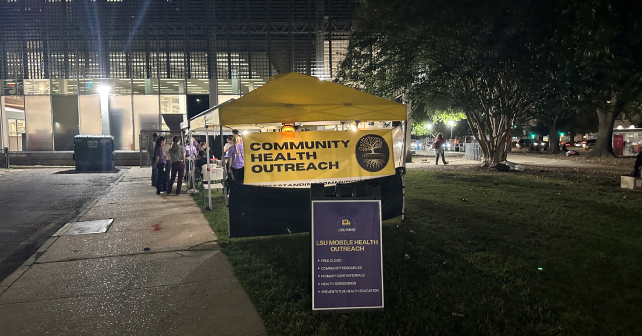
The Free Medical Clinic isn’t just part of a broader network of more than 40 free clinics in the state; it’s one of the largest and operates as close to an ED as possible. With most of its patients typically living at or below the federal poverty line, Dr. Crump said the clinic supports individuals who often face the impossible choice between buying food or essential medications.
Explore This Issue
ACEP Now: Vol 43 – No 12 – December 2024The clinic provides comprehensive services, including primary care, specialty care, and medication distribution, all free of charge. Patients visit a doctor, and prescriptions are prepared at an in-house pharmacy, allowing them to leave with everything they need.
“We dispense over $2 million worth of medications each year,” Dr. Crump said, noting that partnerships with drug companies and community support make this possible.
The clinic operates a first-come, first-served model to ensure fairness and accommodate the unpredictable schedules and transportation challenges many patients face. Clinic staff posts a daily patient limit on the door, giving patients clarity about their waiting time. Although most services are primary care, specialty visits are also provided with dermatologists, cardiologists, neurologists, and gynecologists—all scheduled in advance. Beyond providing immediate care, the clinic emphasizes preventive health services, a crucial component in reducing long-term health care costs and avoiding ED visits.
Dr. Crump recalled a 52-year-old patient who arrived for a routine checkup with no symptoms but had never had a colonoscopy. He talked her into one. Doctors found a large tumor, which was removed with surgery with no need for chemotherapy or radiation.
Dr. Crump’s journey to the clinic began nearly three decades ago when he was a medical student who enjoyed volunteering. He was asked to become The Free Medical Clinic medical director and agreed to do it for two years. That was 22 years ago.
“I work every other weekend in the ER, but I always make time for the clinic,” he said. “This work is too important.”
Driving Access to Health Care
On oppositive sides of the country, ACEP Washington Chapter Immediate Past President and ACEP Public Health Committee Chair Herbert C. Duber, MD, MPH, FACEP, and New Hampshire emergency physician Deepak Vatti, MD, FACEP, volunteer for the delivery of care that involves driving it to where it’s most needed.
Dr. Duber helped grow the Harborview/UW Medicine Mobile Health Outreach Program, has served as a preceptor for years, and still volunteers when the converted van cranks up for a run. Funded by donations, the program provides a free clinic—staffed mostly by student volunteers, but with clinician help—focusing on residents of several Seattle Tiny House Villages just outside the boundaries of the University of Washington.




No Responses to “Emergency Physicians Volunteer to Deliver Care”